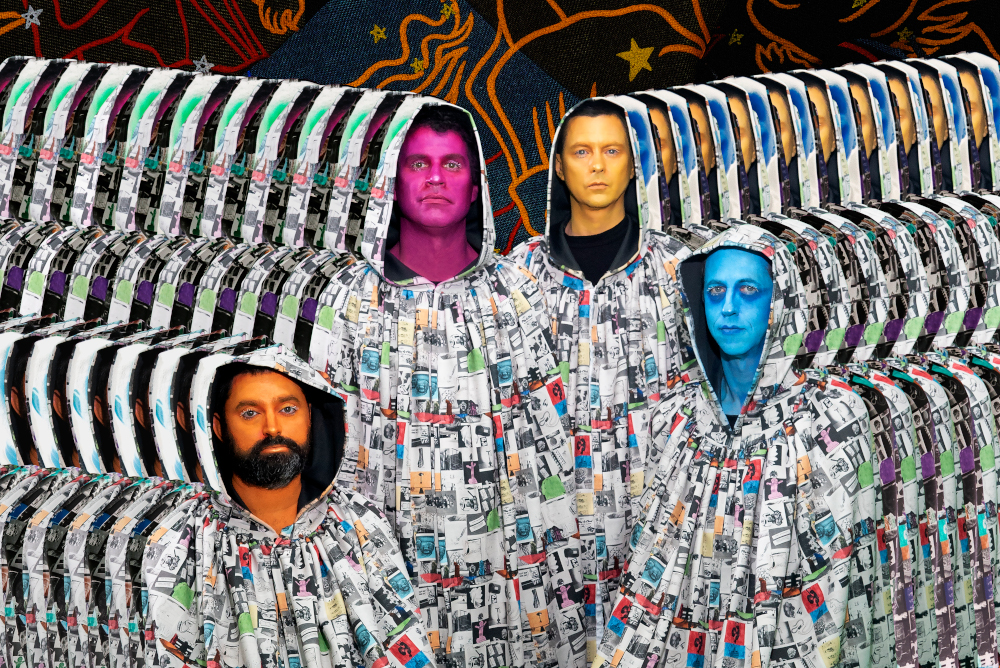
“Raw,” “free,” “loosey-goosey” — these are adjectives no one would use to describe Animal Collective‘s Painting With, an album so bright and intense it often feels like staring into a solar eclipse without the proper eyewear. Six years later, Animal Collective has returned with Time Skiffs, which feels more like gazing casually into a psychedelic forest — the scenery is more textured and detailed, hidden with colorful surprises. And, as the band’s Noah Lennox (Panda Bear) and Brian Weitz (Geologist) describe, it’s, well, a lot more “raw,” “free” and “loosey-goosey.”
“It’s pretty typical with us for the new thing to be some kind of reaction to the previous thing,” Lennox tells SPIN over Zoom, making gentle eye contact as he swivels in a brown desk chair. “We’ve completely gone the opposite direction a bunch of times — just wanting a different energy or something that feels refreshing. And that’s typically the inverse of what we did before.”
Fans understand these pivots are part of the ride: Contrast, for example, the electric buzz of 2007’s Strawberry Jam with the beat-driven landscapes of their 2008 landmark, Merriweather Post Pavilion. But Time Skiffs‘ vibe also blossomed organically, dating back to a pair of March 2018 performances at a New Orleans sound sculpture park called Music Box Village.
“Noah couldn’t make it over — he was really heavily into the sessions for [his 2019 solo album] Buoys,” adds Weitz, chatting from a room filled with audio equipment. “So Dave [Portner, aka Avey Tare], Josh [Dibb, aka Deakin], and I just decided, ’Well, let’s write some kind of a new composition — it can be pretty loose. It will mostly rely on the sound sculptures, and it’ll just be more like an experimental thing. We’ll invite some local musicians down there to play with us.’ But we ended up writing a bunch of stuff. A lot of it still was pretty free and weird-sounding, but we wrote like 70 minutes of new music very quickly — the three of us each wrote a few demos and sent them to each other. And then like in one weekend of practice, we had a 70-minute set.”
The atmosphere of those performances survived on Time Skiffs, even if not all of the material did.
“Just being in New Orleans, it’s kind of slow and humid and stoned or something,” Weitz continues. “A few a few tracks, like ‘Prester John’ and ‘Royal and Desire,’ started there at that instillation. So I think that that vibe sort of just like carried into the writing of all the material that we eventually did as a full band.” Lennox adds: “It sort of set the tone for Time Skiffs — we had a couple of those songs, and it became about like trying to match new songs to that sort of feel. Ultimately that show kind of dictated what the thing became.”
The duo spoke to SPIN about chasing that freer spirit — through pandemic-era file-swapping, rhythmic meditation, and experimenting with strange instruments (like hurdy-gurdy and, um, the bass guitar).
[embedded content][embedded content]
You started off with 70 minutes of material before you even gathered new ideas and started recording. And you ended up with a 47-minute album. How much material did you end up recording, and what got left off?
Lennox: Originally I feel like we had about two records worth of stuff to choose from before the pandemic hit. And then with the pandemic, we kind of had to choose songs that we felt like we could pull off remotely. So a lot of the times it was the more like rhythmic ones, the ones that didn’t have a bunch of kind of like loose ambient passages that relied more on like the performative dynamic between us.
Weitz: It just suffers. It’s not even necessarily just ambient stuff, but some parts kind of rely on like eye contact or just like feel like when everyone’s gonna kick in —
Lennox: Yeah, everybody kind of goes together. There were two or three [songs] we felt like we didn’t totally get right that we left off and will be on some future thing. We’ll get it done eventually. But we whittled down the edit that we made.
When you’re recording remotely and swapping project files, it tends to define people’s roles a bit more clearly — and you guys are kind of known for bouncing around to different sounds and instruments. How did that shake out?
Lennox: I think it’s fair to say we had more defined roles from the get-go than on a lot of other things that we’ve done. Dave really wanted to play bass, and I was really kind of on this drum trip. And Josh, I know, wanted not to kind of not play guitar if he could. Those three things were definitely something we all talked about before we even got going.
Weitz: It was primarily written, as is often the case, other than a few times, to be performed live before it was written for the studio. By the time the pandemic came and we realized we couldn’t go record in a studio, the live arrangements for the songs were really set. And they were set to play a full show of music where there can’t be a ton of instrument-switching. Dave was like, “Well, I want to just do the bass this time” because he’s he played some bass on his solo record [2019’s Cows on Hourglass Pond] and in the New Orleans show. So he bought a bass for the first time in his life and was enjoying playing it.
It’s such a bass-heavy album. But when I think back on your catalog, is their bass guitar on any of this stuff? Like, it’s not really a sound you guys are known for.
Weitz: “What Would I Want? Sky” it’s on.
Lennox: That felt really weird. Like, “We’ve never had bass on a song before. This is weird.”
Weitz: Maybe on “Peacebone,” but I don’t think it was intended to be. It’s usually bass-synth or a baritone guitar. But yeah, Dave had bought one and really enjoyed playing it.
Lennox: [His bass lines on Time Skiffs] super weird to me too. They’re like little melodies in the song, which is like the opposite of how I would do it. They’re really cool.
That brings me to what could be my favorite song on the album, “Cherokee.” That bass line on that song is super weird — high register and not playing the role of a traditional bass guitar. I also love the climax of that song where it just sort of gets really trancey and builds and builds. The first time I heard it was on headphones during a walk, and I got so distracted I had to sit down.
Weitz: I think that might be my favorite on the record too, or at least one of them. That was [from] a demo Dave sent.
Lennox: All of it was in the demo. He fully blueprinted it out, and we knew it was gonna have that build in the middle.
Weitz: I don’t I don’t want to say too much about his songwriting, but I know like he the melody came to him like in his car. He lives in the mountains in North Carolina, and like the weather, there can be kind of specific sometimes. He would send me photos and stuff, especially once we got to mixing the record because I was prepping a lot of the stems and was most in touch with Marta [Salogni], who finalized the mixes and stuff. He just sent me a photo of the weather one day and was like, “The song should sound like this.” He was kinda on that from the beginning, especially a lot of the more like atmospheric stuff that he and I did on the song, like hurdy-gurdy stuff and oscillators. When he and I would talk about it, it was like trying to make it seem like you were kind of driving through a certain mist or vapor or something that would have like a tangible quality.
[embedded content][embedded content]
“We Go Back” is another highlight for me because it’s such a collage of random ideas and sounds. It’s set in 10 time; it has bursts of auto-tune, hints of glockenspiel and what sounds like a saxophone. How much is being played live, and how much is sampled? Help me decode that one.
Weitz: I guess at a certain point it depends what you mean by “live” — there are sampled sounds from sample banks, but they’re like played on sampling keyboards, where they’ve been processed by our own effects and stuff. But like things like glockenspiel or chimes, we didn’t have access to good-sounding instruments of those. There were some times where we did replace stuff, like there’s a Nagoya harp on that song — it’s sort of like a trebly Echo and the Bunnymen guitar, but it’s not. I made a fake version of that with my modular synth. And then like a friend of mine had a real one. And I was like, “Alright, I’ll just play it on that.” But for the most part, some of those chromatic percussion things are coming out of like keyboards or synthesizers that have sample banks or sample packs, where you just have the one note and you map it onto your keyboard.
[embedded content][embedded content]
The drums are so essential to this album. Noah, were you focusing a lot more on just playing the kit? And if so, was that freeing in a way?
Lennox: Yeah, I definitely got into drumming, but I feel like in a different way than I had before. Mostly being inspired by a lot of the James Brown drummers, particularly Clyde Stubblefield. I spent a lot of time trying to play the “Funky Drummer” beat. How did he do that? The hi-hat is almost machine-like, and I really wanted to be able to play like that. So that kind of became my mission: being able to play sort of like a lighter touch, focusing a lot more on the tonal qualities of the drums rather than just kind of whacking them. So overall, I feel like my playing is way quieter than I’ve ever done before. Even kind of stupid technique things, like playing with my foot flat on the kick pedal, so I’m kind of always just feathering the bass drum rather than stomping it.
At first, I couldn’t do any of it really — it was really kind of clunky and sloppy. But practice, especially during the pandemic, become like a meditation for me. Something I really like about drumming is the physical part of it. It’s almost like a workout sometimes. And also just the repetition. I feel like sort of how video games make me tune out in a way that feels really refreshing to me, drums do the same thing: occupying that part of my brain that’s always like fretting, occupying it with some sort of like task. And then I can kind of just like, float. I tend to do it like every day now.
Noah, “Car Keys” seems like a natural one to talk about since you’re singing lead on that one. That’s one you debuted live in 2019 under the title “24,” and the lyrics have always been really fucking dark. Where did all that come from?
Lennox: The “24” title came because I made like 33 demos of songs. And they were just numbered; I didn’t have titles for them. So 24 was like the number of that one. I can’t remember who suggested it, but when we first started working on it, somebody had the idea that, in the verses, every instrument would pass off to the next for every phrase. As far as the lyrical content, it’s really I feel like it’s a subject that I’ve been sort of hovering around for a while — certainly on Buoys, a little bit on [2015’s Panda Bear Meets the Grim Reaper]. But it’s just sort of thinking about human instincts and kind of why we act as we do, especially the kind of darker, uglier sides of us. Where’s that come from? And why is that happening? So car keys are sort of like the symbol of who’s driving this thing?
[embedded content][embedded content]
Vocal harmony has always been an essential part of Animal Collective, but it’s utilized in a different way on Time Skiffs. On an album like Merriweather Post Pavilion, it’s almost like just this big amorphous cloud of voices. But on tracks like “Prester John,” for example, you can hear and feel the character of the individual voices.
Lennox: I’m not sure there was like a target or an intention of that, but I definitely agree. That’s kind of how it came out, like it feels way more kind of loosey-goosey than other stuff. Part of it was feeling like it suited the music to have the vocals rawer. It’s not like we didn’t do multiple takes of things to try to get it right. But I feel like it was less about getting these really exact, pitch-perfect lines and more about the feeling of three guys singing in a room together. I feel like that’s sort of what we were going for. It sounds more like the [Grateful] Dead to me.
Coincidentally, or maybe not, I actually thought of “What Would I Want? Sky” — which famously samples the Dead — a couple of times while listening to this album.
Lennox: It could be the bass too.
Weitz: And the hi-hat too in that sample. I never actually made that connection. But yeah, all the elements in that are kind of like what we were doing live.
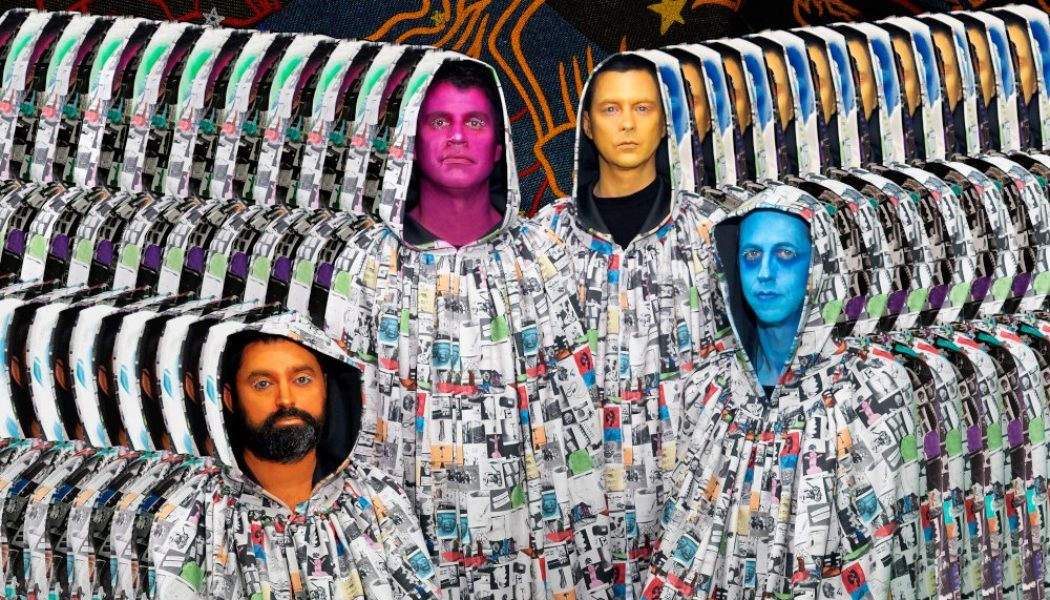


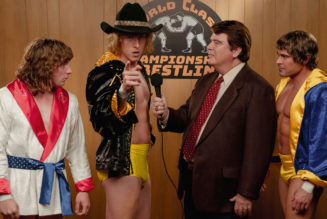
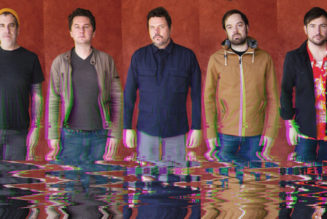



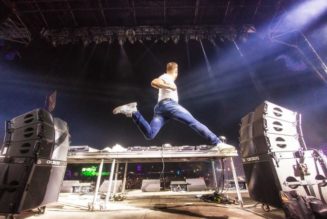
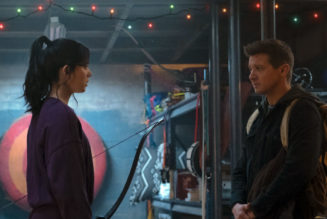
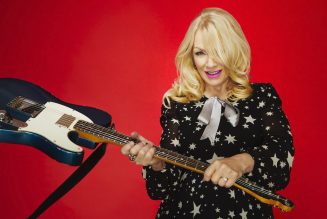
Tagged: animal collective, INTERVIEWS